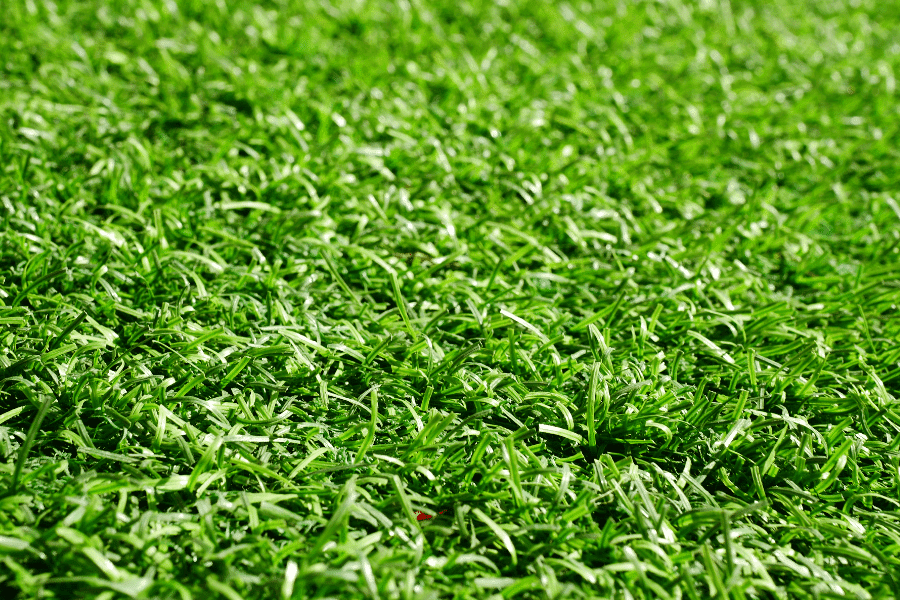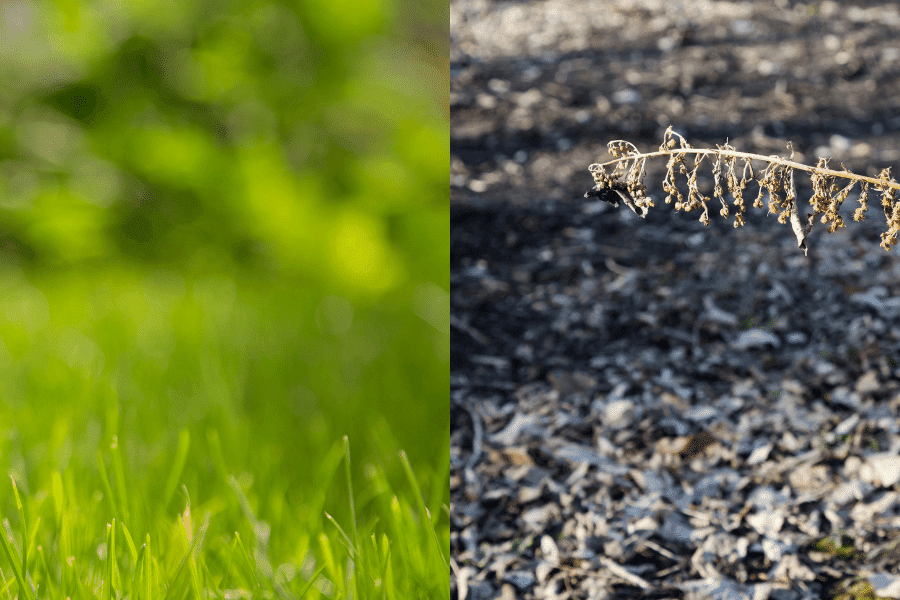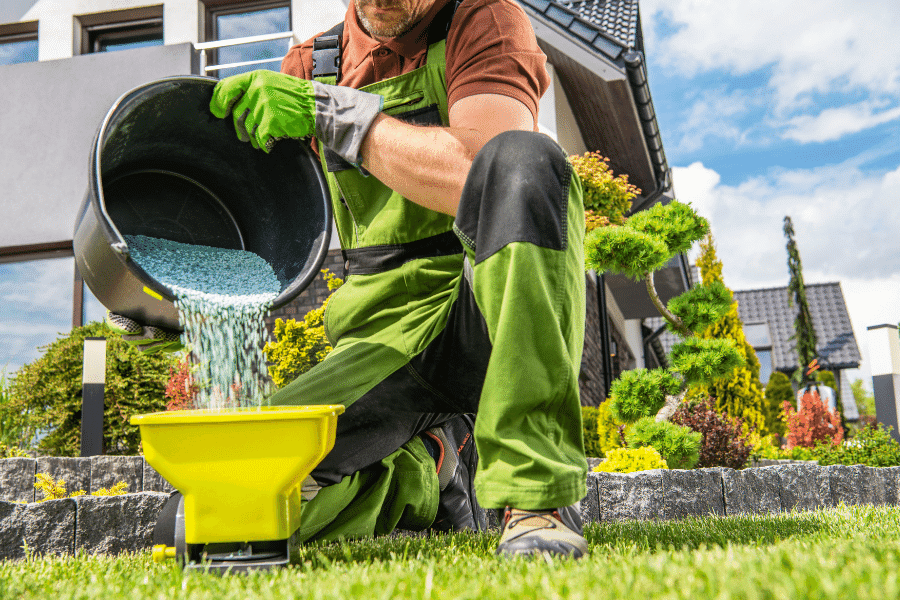Bermuda grass is famous among lawn care enthusiasts.
This grass type is very resilient to drought while not being picky about the kind of soil it grows in.
Due to its unique and resilient growing process, Bermuda grass is generally considered a low-maintenance grass perfect for high traffic lawns.
Many homeowners with pets and kids opt for Bermuda grass to have an excellent lawn for their whole family to enjoy without damaging the grass, but you need to fertilize.
With so many options, it’s difficult to choose, but we’ll help you find the best fertilizer for your lawn.
We’ll also go over some other helpful information to make sure you decide from a knowledgeable standpoint.
Here are the 8 best fertilizers for Bermuda grass to have a fantastic lawn.

Table of Contents
Scotts Southern Turf Builder Lawn Food
Our pick for the best overall fertilizer for Bermuda grass to have a great lawn is Scotts Southern Turf Builder Lawn Food.
Scotts is a brand celebrated for its effectiveness in boosting the health and growth potential of many different types of grasses.
The Southern Turf Builder Lawn Food is no exception.
This product perfectly catered to turf grasses’ needs like Bermuda grass.
The Turf Builder Lawn Food from Scotts is a granular fertilizer making it an excellent choice for those looking for a product to continuously feed their grass for a while.
Granules require a spreader for applications.
After applying this particular product, we recommend generously watering your lawn for a few days if there is no rain in the forecast.
Granular fertilizer tends to need more water to assist in dispersing and absorbing nutrients.
Scotts Southern Turf Builder Lawn food has a fantastic NPK of 32-0-10, and each bag covers up to 10,000′ square feet.
The high nitrogen content in this product helps to improve your lawn’s ability to absorb water and nutrients leading to a quenched and thriving lawn.
It also helps to build the lawn’s resistance to drought.
Due to its versatility and trusted name, we recommend Scotts Southern Turf Builder Lawn food as the best overall fertilizer for Bermuda grass.
Milorganite Organic Nitrogen Fertilizer
There are many reasons why people opt for organic versions of fertilizer for their lawns, but what is the difference?
Organic fertilizers like this Milorganite fertilizer are made from natural compounds, usually manure of various kinds.
Non-organic fertilizers are made of synthetic chemicals which may be harmful to wildlife, and water sources should runoff reach waterways.
Synthetic nitrogen is responsible for harming fish and contaminating water sources.
If your property is near a river, it’s a good idea to opt for natural fertilizers and products to protect wildlife and the integrity of the water.
Milorganite is one of the most celebrated organic brands for fertilizers and weed killers.
This particular product is granular and made from manure.
It is an excellent choice for those concerned with runoff and pollution from their property.
It works as an excellent nitrogen-rich fertilizer for Bermuda grass lawns.
This size bag covers about 2,500′ square feet of Bermuda grass.
The nitrogen-rich fertilizer also boasts an NPK of 6-4-0.
The lack of potassium may not be well suited for everyone.
Make sure the NPK ratio of whichever product you choose is the best fit based on your soil test results.
The main drawbacks of organic fertilizers are often reflected in the price and odor.
Synthetic nutrients tend to be easier and cheaper to create in a lab setting.
Manure takes time and animals who need food, shelter, water, and veterinary care.
The higher price tag reflects the energy and time needed to collect quality manure for fertilizers.
Some homeowners also do not appreciate the pungent aroma of manure on their properties and opt for synthetic fertilizers.
Many people find these drawbacks worthy by protecting local water sources and wildlife.
Miracle-Gro Water Soluble Lawn Food
Water-soluble lawn foods tend to be much easier for applications than other forms of fertilizer.
These fertilizing products are best for those with a smaller area of Bermuda grass lawn.
All it takes for application is to screw your hose onto the container. The Miracle-Gro Water Soluble Lawn Food comes in four packets.
Each packet contains enough fertilizer to feed about 1,800′ square feet at a time.
Because you need a hose for this specific type of product, it’s best to make sure your hose reaches the entirety of your Bermuda grass lawn.
The Miracle-Gro Water Soluble Lawn food boasts an NPK ratio of 30-0-6.
The high nitrogen to potassium ratio makes it an excellent fit for feeding and nurturing a Bermuda grass lawn.
The water-soluble product is easily absorbed into the soil and grass and results in a shorter time than granular types.
The boost of nitrogen helps to encourage a lush, dense, and green Bermuda lawn.
Getting the 5 lb container for about $16 makes it an excellent choice for budget-conscious lawn care enthusiasts.
We pick this as the ideal fertilizer for those with smaller lawns looking to save some money and still have a fantastic yard.
Scotts Turf Builder Triple Action

Putting a lot of work into your lawn only to discover unwanted weeds popping up is discouraging and frustrating.
It often means more work and money to nurture the Bermuda grass but kill unwanted weeds like dandelions and clover.
Luckily, Scotts Turf Builder Triple Action covers all the bases in one application.
This particular product from Scotts features a 3 in 1 formula making it our top pick for combination fertilizer and weed killer.
The product kills active weeds and prevents new ones from popping up.
It does all this while nurturing your Bermuda grass and promoting a lush, green lawn.
It prevents crabgrass for up to four months as well.
The product has an NPK of 16-0-1.
The high levels of nitrogen help to grow the dense and full Bermuda lawn of your dreams.
Follow the instructions carefully to get the most from the weed killer and preventative aspects of the product.
Successfully killing broadleaf weeds like dandelions and clovers requires proper timing.
You’ll want to apply the product after rain or early in the morning when the grass is still wet with dew.
The moisture on the weeds allows the weed killers to be absorbed into the leaves and successfully kill the unwanted weeds.
Simple Lawn Solutions Maximum Green
There are many reasons why your lawn would require high nitrogen fertilizer, like the Simple Lawn Solutions product.
There are some tell-tale signs, but soil analysis is the most accurate way to determine this.
Collecting soil samples is the best way to determine what you need from a fertilizer.
Other indicators are pale-colored grass, patchy lawns, and slow growth.
If you conduct a soil test and the results reveal deficient nitrogen levels, this is the product for you.
With an NPK of 28-0-0, this power-packed, nitrogen-rich helps boost the growth potential of your grass and create dense, green grass.
As we know, nitrogen is a vital part of proper and overall growth for plants.
There are many fertilizers high in nitrogen, but there’s a reason why this is our top pick.
Simple Lawn Solutions Maximum Green fertilizer features both quick absorption and slow-release nitrogen.
Seventy percent of the fertilizer is quick-release, making it ideal for rapid results through fast nitrogen absorption.
The other thirty percent is slow-release, so the product continues to feed and nurture your lawn over a longer time.
Simple Lawn Solutions Advanced Liquid Fertilizer
If you look out at your lawn and see it yellowing, it’s time for some fast-acting nutrients from a quality fertilizer.
Check out our guide on how to help yellow Bermuda grass.
In these situations, liquid fertilizers are your best bet.
We chose Simple Lawn Solutions Advanced Liquid Fertilizer as the best liquid fertilizer.
With an NPK ratio of 16-4-8, it is an excellent choice for Bermuda grass to have a fantastic lawn.
Each bottle feeds roughly 3,200′ square feet.
Another plus is the option of straight liquid to use in a sprayer or spray nozzle to attach to your hose, depending on your specific needs.
Another benefit of this particular product is its use of organic ingredients.
You don’t need to worry about chemical runoffs or pollution with this fertilizer.
This is especially good news for those with dogs, cats, or wildlife roaming their yards.
The main ingredients of this liquid fertilizer are seaweed and fish.
These ingredients pack macronutrients into the product, making it able to continue to boost the health of both your soil and grass.
Lesco Professional Turf Fertilizer
Slow-release fertilizers are an excellent choice for those looking to get the most out of a single application at a time.
The Lesco Professional Turf Fertilizer uses a patented Poly Plus technology to release nitrogen over longer periods slowly.
Each bag covers about 50,000′ square feet.
It is great for those with larger lawns looking to make less fertilizer application each season.
With an NPK of 16-4-8, the product is an excellent fit for Bermuda grass lawns.
It also contains iron. Iron is great for improving the color of your lawn.
The Lesco Professional Turf Fertilizer instructions recommend applying the product in the spring to kick start a lush, green lawn.
Simple Lawn Solutions Lawn Energizer
For those of us with relatively small lawns, water-soluble fertilizers seem to be the best when it comes to ease of application.
So long as our hoses reach the entirety of our lawn, water-soluble fertilizers make applications a breeze.
Quality sometimes suffers for the sake of convenience, but this is not something you have to worry about with the Simple Lawn Solutions Lawn Energizer.
Simply screw your hose onto the sprayer bottle to get all the benefits of this great product.
It features an NPK of 6-0-0.
You may need to supplement with a potassium or phosphorus fertilizer if your soil analysis showed deficiencies of either of those nutrients.
If you need simply nitrogen, this is the best water-soluble fertilizer.
The Lawn Energizer Micronutrient includes iron and other micronutrients to promote dense, green lawns.
What To Look For In A Fertilizer?

There are a few factors to consider when choosing a fertilizer.
You’ll need to address your specific needs and the needs of your lawn to know what to look for.
The Importance Of Soil Tests
One of the best things to do for the health of your lawn is to conduct a soil test.
The results let you know exactly what your soil lacks.
This means you’ll be able to accurately pick a fertilizer to make up for natural deficiencies in your lawn.
Conduct the soil test at the beginning of the season before fertilizing to get the most accurate results.
The results will often let you know if you need to focus on adding nitrogen, potassium, or both to your lawn to promote healthy growth.
Do I Need Results Fast?
Sometimes extreme heat and drought seemingly come out of nowhere and take a huge toll on our lawn.
If your grass is looking rough, you’ll want fast results and quick absorption of nutrients.
Quickly absorbed fertilizers come in liquid or water-soluble form.
You may need to make more applications than you would with granular fertilizer, but you’ll be able to get the nutrients your suffering grass needs much more quickly.
How To Decrease The Need For Frequent Fertilizer Applications
If you’ve been keeping and caring for your lawn for a while, chances are you may be looking for a way to decrease the number of applications you need to do each year.
Why do more work than you need to?
You won’t need fat absorption if you stay on top of fertilizations.
Granular and slow-release fertilizers help to reduce the number of applications you need to do each year.
These products continue to supply the soil and grass with nutrients leading to less frequent applications.
Types Of Fertilizer For Bermuda Grass
You may have noticed the different forms of fertilizer during your quest for the perfect fertilizer for your Bermuda grass lawn.
Each type has its benefits and drawbacks.
It helps to understand these aspects when choosing a fertilizer product.
Granular
Granular fertilizer comes in the form of tiny pebble-like granules.
They are often applied with spreaders like this.
While they tend to nurture the lawn for longer periods, they are not usually quickly absorbed.
If your lawn looks healthy and you are applying routine fertilization, granular fertilizer is a great option.
If your lawn is suffering and yellowing due to a lack of nutrients, you’ll want to use a liquid or water-soluble fertilizer for faster-acting fertilization.
Liquid
Liquid fertilizer is a great option to quickly get nutrients absorbed into your soil to improve the health of your Bermuda grass lawn.
Liquid applications are made with a sprayer like this.
Many people like the liquid products for their fast-acting results, but many homeowners find they need to make more applications as the product tends to get absorbed very quickly.
If you are looking for fertilizer to sustain the lawn for longer periods, you’ll need a granular option.
Water Soluble
Water-soluble options are convenient options for small lawns.
The products are designed to be attached straight to your house.
If you choose this product, make sure your hose reaches all the areas in need of fertilizer.
Like liquid fertilizer, water-soluble products tend to be absorbed quickly and may need more frequent applications.
They are also absorbed quickly, so you will see results much faster than with granular options.
When Do I Fertilize My Bermuda Grass Lawn?
Determining when to fertilize your Bermuda grass depends on quite a few factors.
The biggest thing to consider is the results from a soil test.
Before fertilizing, run an annual soil test to determine your soil’s makeup and what to focus on with your fertilizer.
This is also extremely beneficial when establishing a new lawn made up of Bermuda grass.
Most experienced lawn care enthusiasts fertilize three times a year to encourage new growth.
It helps to fertilize your Bermuda grass lawn a few times a year to promote an amazing lush lawn.
You’ll notice the three fertilizations all take place during the summer.
Why is this the case?
The reason is summer is the prolific time for grass growth.
The grass exerts a lot of energy for growth and water absorption.
In many ways, routine fertilizer applications give your lawn the added boost of energy to get the most out of the growing season.
Fertilize In Early Summer
The first application of nitrogen-rich fertilizer should occur in early summer after receiving soil tests.
Timing your first fertilization is important for the health of the lawn.
You want to wait until the lawn comes in fully.
This usually occurs in May for most climates but maybe sooner if you live in a warmer place.
Apply roughly ½ to 1 pound of fertilizer per 1000′ square feet of lawn.
Make sure to consult the instructions on the specific fertilizer product you choose.
Mid-Summer Fertilization
The next application occurs in either June or July.
You’ll want to use the same amount of fertilizer as your first application, roughly ½ to 1 pound per 1000′ square feet.
During this application, you’ll want o use a fertilizer with higher potassium levels.
The ideal NPK for the middle summer fertilizer application is 15-0-15.
Late-Summer Fertilization
The last application of the growing season will be in late summer during August for most climates.
LIke the mid-summer fertilization, you’ll want to use a product with an NPK ratio of 15-0-15.
Using a fertilizer with potassium is very beneficial for grass towards the end of the growing season.
Potassium helps make the grass more resistant to disease as it enters its dormancy stage.
This is especially important if you live in a climate with colder temperatures.
The potassium also helps to increase the hardiness of the grass, which is extremely helpful when it gets very cold.
What Is NPK, And Why Is It Important?
NPK is the acronym used to describe the ratio of ingredients in each fertilizer.
The N stands for nitrogen, the P stands for phosphorus, and the K stands for potassium.
Different grass types require different levels of each of these elements.
Knowing the correct NPK ratio for your specific grass type is key to having an awesome and thriving lawn.
It helps to know what each element helps understand why this ratio matters so much when choosing a fertilizer for your lawn.
- Nitrogen is extremely helpful in stimulating leafy green growth.
- Phosphorus plays a key role in supporting flower and fruit production for plants.
- Potassium is known for its ability to improve and support the overall health of plants. It is also helpful for increasing disease resistance and cold weather hardiness in grasses.
As you may have guessed from their unique purposes, nitrogen is the most important for use in fertilizing grasses.
Chances are you are more interested in supporting the overall health and stimulating leafy green growth than you are in flower and fruit production.
This is why the best fertilizers for Bermuda grasses to have an amazing lawn have an NPK ratio consisting of mostly nitrogen.
You’ll want some potassium in your fertilizer to assist in the overall health of your lawn.
Still, there is little need for any phosphorus in your fertilizer and should be avoided when choosing a fertilizer for your lawn.